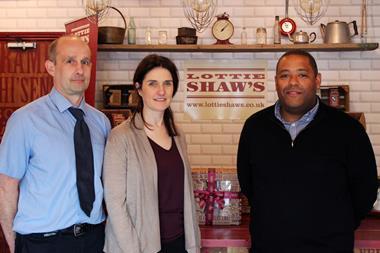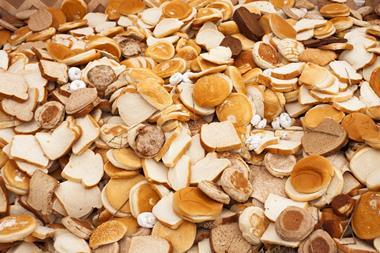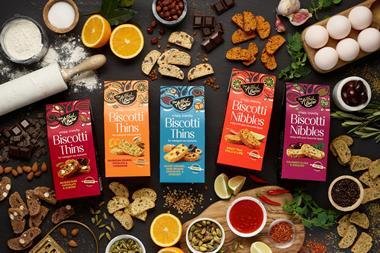Bakery retailers have reported a “good” to “satisfactory” Christmas despite a “terminal decline” in sales of traditional Christmas lines such as Christmas puddings.
The decline was widespread, from supermarkets to craft bakers, a British Baker straw poll of leading craft bakery and supermarket figures on the topic of Christmas trading indicates.
Alan Stuart, MD of the 17-store Scottish retail bakery chain Stuarts of Buckhaven, summed up the trend. “Traditional lines, such as shortbread and black buns (heavy fruited
pastry slabs), are in decline, as young people are not picking up the habit,” he said. “They favour savouries. Christmas puddings and those sorts of lines are in terminal decline.”
And Nantwich–based craft bakery Arthur Chatwin with 19 shops, also felt the impact of changing consumer demands. Joint MD Trevor Mooney said: “Sales of Christmas cakes and puddings were down on previous years, by around 10-15%. I don’t know if traditional Christmas lines are becoming less popular, but they are generally down by about 2% every year. Supermar-kets also have a bearing on it.”
But the trend was also apparent at the supermarkets. Waitrose’s central buyer, bakery, Teresa Lindley commented: “We did very well on Christmas puddings and reasonably well on Christmas cakes, but there is a move to offering a non-traditional option and I think there is a lot more mileage in that.”
Tesco also noticed the shift. Senior bakery buyer Andrew Brocklehurst told British Baker Tesco had a very good Christmas, with sales up year-on-year and ahead of plans, both
on seasonal and day-to-day items. Bread sales, cakes and mince pies were strong. But “Christmas puddings were more of a struggle,” he said.
“We came out of Christmas relatively clean, but we had good availability up to Christmas,” he added. Mike Holling, retail operations manager, Birds of Derby, with 50 shops said Christmas products did well, but sales were driven by novelty impulse lines. “Christmas lines generated in excess of £62,000 over the seven-week Christmas period, with little leftover stock,” he noted. “Sales of traditional Christmas products increased; we had a nice range of cakes, slabs and Santas, and the impulse part of the market did exceptionally well. Our 80p Santa lollies also sold well, with a 19.6% increase in sales to 10,200.”
Asda also enjoyed good sales of Christmas lines, boosted by favourable reviews. Overall trading was “not spectacular, but reasonable”, said bakery director Huw Edwards. Lines produced in-store did best, he said, adding: “We have broken very clean over Christmas with markdowns below expectations. One line that was a surprise was Yule logs, which sold out early due to some very good press coverage over the Christmas period. In the end we were embarrassed by not having enough on the shelves. Our mince pies also got some positive reviews in the press in the festive season, so demand was high for them.”
Robert Ditty, MD of two-shop Ditty’s Home Bakery in Northern Ireland, was the most enthusiastic of those polled by British Baker, reporting “an excellent Christmas”.
Although lines such as mince pies and Christmas puddings “always sell well”, he noted a drift away from heavy fruit cakes. “People want things a little lighter,” he said. “Sales of cream products were very high on Christmas Eve. We do a lighter Christmas pudding which sells well. We had a superb two weeks leading up to Christmas and, on Christmas Eve, we had to put customers outside and lock the door.”
Sales were up by 25-30%, he said – a figure that so surprised him, he had to check it “several times”. Meanwhile, one craft baker who reported he bucked the decline in traditional products was John Weinholt, of two-shop Weinholts of Cheshire. He commented: “We are always particularly strong over Christmas due to our focus on the craft side. Our strong sellers were savouries – sales were very good. We were also strong on traditional Christmas lines. Our cakes went very well and so did our puddings.”
However, bakery retailers who major on takeaway products were hit due to their office-based customers being on holiday. “From talking to friends in the British Confectioners’ Association and the Scottish Association of Master Bakers, the more we rely on takeaway, the more we get hit over Christmas as customers have time off work and the lunchtime trade is down,” said Alan Stuart. “Takeaway can be 50% of their business.”
In general, bakers surveyed appeared glad to have the festive season out of the way. Mr Stuart said: “Christmas is difficult, as you make high-cost products and the mark-up is not as good as on standard lines. Everything is done at the last minute, so ordering is a problem, and Christmas is moveable, so sales are difficult to compare year-on-year. You lose four days’ turnover over the period and pay a lot of overtime. My favourite day of the year is the Monday after New Year’s Day when everything gets back to normal.”
Trevor Mooney joint MD, Arthur Chatwin: “The Friday and Christmas Eve were busy, as we predicted. We found people started buying later as there was a full week running up to Christmas on the Sunday. All Chatwins stores had Christmas window displays. The Chatwins trophy for the best display went to our shop in Lawton Road, Alsager, this year.”
lan Stuart, MD, Stuarts of Buckhaven: “It is
difficult to compare sales due to the way Christmas fell this year – on a Sunday. In Scotland we have an extra holiday so that meant our 17 shops were closed, from Saturday to Wednesday. Overall sales were steady, but it was not our best year. I would say we were up by 3%, which, taking into account price rises, means we broke even. We were reasonably happy; production was right and there were not many returned products.”
Teresa Lindley, central buyer, bakery, Waitrose:
“Christmas is a key area for Waitrose. Trading on mince pies was phenomenal, with a 30% increase in sales value. We did well on puddings and cakes but noticed a shift in decorated cakes to more contemporary designs and sponges. The challenge for Christmas 2006 will be to supplement our traditional assortment with an increased non-traditional offer, to meet changing needs.”
Mike Holling, retail operations manager, Birds of Derby: “Trading was out of sync as there were 53 weeks in the year last year, but we were not down. Our best seller over Christmas was pork pies – we sold 35,000. Birds’ outlet in Albert Street, Derby, took a record £10,000 in one day. People like to buy their food as fresh as possible, so it is worth spending time choosing seasonal ranges and pricing them correctly.”



































No comments yet